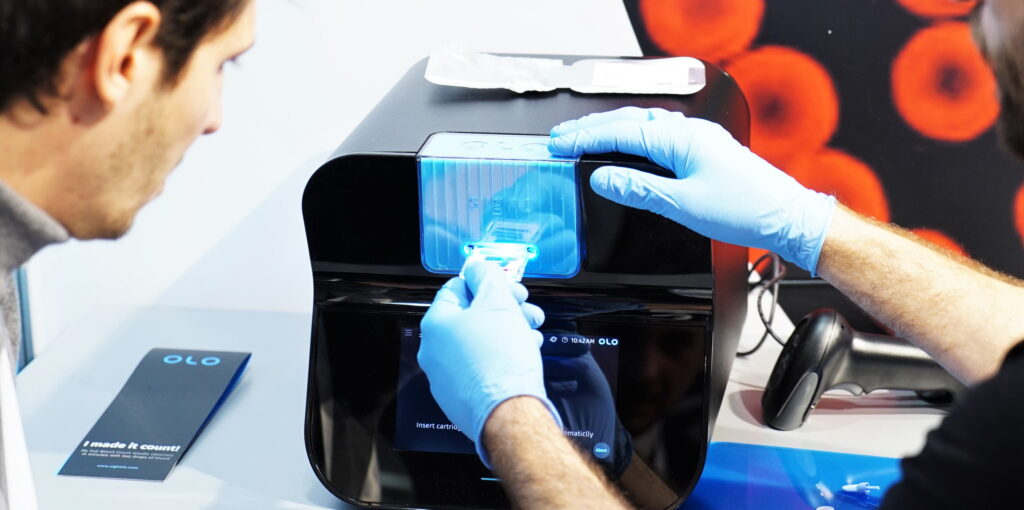Israeli-founded firm Sight Diagnostics, the company that developed lab-grade blood testing systems with results in minutes, has deployed its OLO analyzer at the John Radcliffe Hospital, a teaching hospital that forms part of the Oxford University Hospitals NHS Foundation Trust.
The deployment allows for rapid full blood count (FBC) testing for patients in emergency departments and supports the validation of a rapid artificial intelligence triage system for COVID-19.
Sight Diagnostics’ OLO leverages AI with a revolutionary method to ‘digitize’ blood, allowing patients to receive blood test results within minutes at the point-of-care, and with just a finger-prick. The system takes detailed images of blood and then analyzes them with AI-driven computer vision algorithms. The testing includes CBC (Complete Blood Count) tests which are the most basic and informative tests medical professionals can conduct.
The device, about the size of a toaster oven, is compact and uses a cartridge-based system that does not require external reagents or routine calibration and maintenance, making it simple to set-up and operate wherever FBC is needed.
Sight OLO received regulatory approval for use in the UK and is CE Marked according to the IVD European directive at point of care settings. In the United States, Sight OLO is 510(k) cleared for use in moderate complexity laboratories.
Sight’s OLO analyzer enables faster predictions to be generated by Oxford University’s “CURIAL AI” screening test, which leverages patients’ routine vital signs and FBC result to predict the likelihood of a patient having COVID-19, the company said in a statement.
The CURIAL algorithm, developed by a cross-disciplinary team at Oxford University, has proven to be an effective triage tool that can rule out COVID-19 within the first hour of a patient coming to the hospital. With CURIAL, the Sight OLO analyzer could allow staff in emergency rooms to receive an accurate prediction to rule out COVID-19 in under 30 minutes.
“Having accurate FBC results in minutes, from OLO, would help CURIAL make predictions even sooner, potentially reducing care delays and supporting infection control within hospitals. Our goal is to get the right treatment to patients sooner by helping rule-out COVID at triage for a majority of patients who don’t have the infection,” said Dr. Andrew Soltan, an academic clinician and a machine learning researcher at Oxford University. “This project shows that artificial intelligence can work with rapid diagnostics to help us select the best care pathways and minimize risks of spreading the infection in hospitals.”
“We are excited to trial OLO point of care FBC analyser in the ED as a way to validate the CURIAL algorithm even faster than traditional lab-based results,” said Dr. Ravi Pattanshetty, a consultant (attending) in Emergency Medicine at the John Radcliffe Hospital. “We have found OLO really easy to use and we hope to use OLO in the future to improve routine clinical care for our patients.”
Yossi Pollak, CEO and co-founder of Sight Diagnostics, said the company was “proud to collaborate with a cutting-edge institution like Oxford University on their CURIAL analysis program to help manage the effects of the pandemic.
We see time and again when FBC results are made available to clinicians quickly and easily, patient care models are reconfigured for the better. The CURIAL project is a beacon of what’s possible, and we are keen to support other health institutions by enabling access to fast, convenient, and accurate FBC through OLO.”
Related posts

Israeli AI Safety Tool Among TIME’S Best Inventions For 2024

TAU Team Discovers Mechanism To Eliminate Cancerous Tumors

Ashdod Port Investing In Startups As Part Of Innovation Strategy




Facebook comments